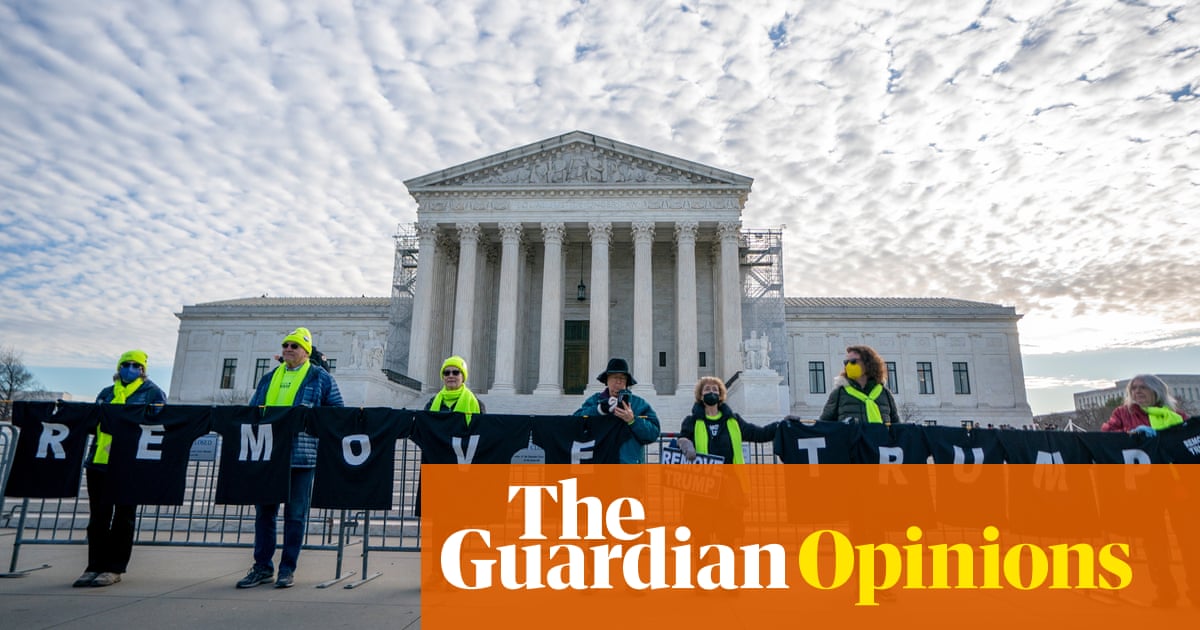The justices, wanting to restore Trump to the ballot, didn’t address the underlying question of if he incited an insurrection
Elena Kagan once referred to Jonathan Mitchell sarcastically as “some genius”. That was in oral arguments surrounding SB8, the bounty-hunter abortion ban that Texas succeeded in passing before the overturn of Roe v Wade, which Mitchell wrote, pioneering a cockamamie scheme for evading judicial review.
Mitchell, a far-right lawyer currently vying for a spot in the second Trump administration, is a fan of this kind of bald, legal bad faith: you can’t quite call him duplicitous, because he never quite pretends that the law really leads him to the conclusions he’d like to reach. He’s more about coming up with novel legal schemes to get to his desired outcome and trusting that the federal judiciary, captured as it is by Federalist Society acolytes and wingnut cranks, will go along with him because they share his political proclivities.
That’s what worked for him with SB8: the supreme court allowed Texas’s abortion ban to go into effect long before Dobbs: not because Mitchell made a convincing argument, but because he offered them an opportunity to do what they wanted to do anyway.
Something similar happened in Thursday’s oral arguments in Trump v Anderson, a question about whether Donald Trump is disqualified from holding federal office under section three of the 14th amendment.



Well that was talked about. Kagan and Alito both touched on plenary power and the degrees that applies to Colorado’s assertion. But in all that was debated Colorado couldn’t find de facto application. Kagan even asked if there was any method that didn’t rely de novo. The argument keep getting into “well this is so unique”. And that’s when it headed into how State’s executed elections post 1860 but pre 1880.
The thing is, even if there was an application to the novel assertion of federalization here… I mean you heard it right there towards the end, “this is a feature not a flaw”. The Court’s couldn’t be remedy to enforce uniformity. I mean just look at Colorado here for a second. You have three cases in the State plus SCOTUS, that’s four hearings. Multiply that by fifty and by three or four major parties that have codified ballot access in the various States. The court’s couldn’t handle that and elections would become “who has enough money for litigation?” Which is kind of the opposite of “having less money in elections”.
And then there comes from that a desire of “Well then Congress could come up with some limit as to what can be litigated before the courts for elections” and then boom, as indicated “how’s that different than where we’re at?” If the idea is that eventually some de facto appears by Congress, why allow novel approach now with the expectation that we’ll get law later when we can equally say why not wait for law today and allow novel to come later based on that?
And Colorado couldn’t find a specific reason why the order should or shouldn’t be reversed outside of “well State’s rights!” And that’s what prompted the question of “well how plenary is plenary to join Article II to 14A S3?”
And another thing that you said in a different comment is:
No. Or at least I don’t think so because doing so would be really hard to justify. Article IV, Section 4. Now the degree can vary because as it was before that only land owners could vote. But then the Naturalization Act of 1790 allowed the frontier folk the ability to vote. The thing is a vote is always required BUT the definition of who it applies to is up to the State, except that 15A, 19A, and 26A further limit the restrictions that States can apply.
But given Art. II S.1 one could literally read:
But in all States the manner is defined by the State’s Constitution meaning that the Citizens would have to vote to amend their process to give up their right to vote and even then, it’s possible such is a violation of Art. IV S.4. It would absolutely be a Court case. But it’s highly unlikely that SCOTUS would permit a State in the Union to operate on a system that denied voting to everyone outside of the political process as that’s kind of the whole premises of the Revolutionary War and that specific part of the Constitution. They would need to include at least ONE person not a sworn officer of the State and given the restrictions of 15A, 19A, and 26A I don’t see how they uphold 14A S1 and keep on the correct side of those other amendments. It would be difficult to say, this one person over the age of 18 is cool to vote AND still uphold 14A S1 equal protection and deny OTHER 18 year olds. It would definitely be an exercise.
States have rights, but SCOTUS is the first place to tell someone, “No right is absolute”. And multiple justices brought that up plenty of times with the perceived plenary that Colorado attempted. I would love Colorado’s reading, but SCOTUS has a point, Colorado needs to define a line in the sand and not just be like “Well that’s what SCOTUS is here to do, draw lines”. I mean given the track record recently, I don’t think we should let SCOTUS draw lines. And yeah, funny time for them to suddenly adopt that mantra. But that’s the thinking I agree with, which is why WV v EPA was such bullshit in my opinion. But I cannot think both WV v EPA was bullshit and Colorado is correct here. That just doesn’t jive. I get inconsistent SCOTUS is frustrating, but at least questioning where that line is from Colorado is the correct move, not leaving it up to SCOTUS to dictate.